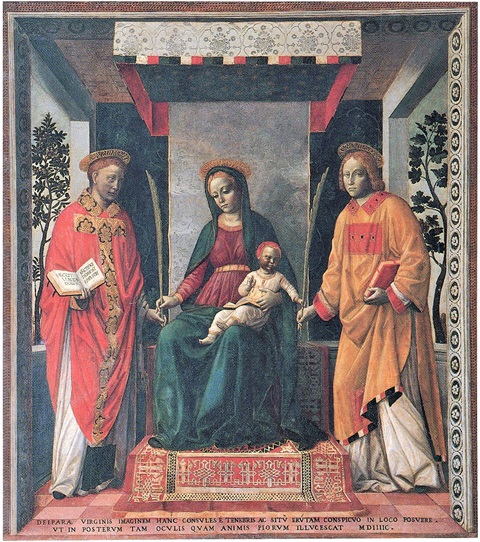February 15, 2021: SS. FAUSTINUS AND JOVITA
February 15, 2021: COMMEMORATION OF SS. FAUSTINUS AND JOVITA, MARTYRS
For to them belongs the kingdom of heaven, who despising the life of this world, have obtained the rewards of the kingdom, and washed their garments in the blood of the Lamb.
Prayer (Collect).
O God, who by the yearly solemnity of thy holy Martyrs, Faustinus and Jovita, comfortest us thy people; mercifully grant, that, as we rejoice at their merits, we may likewise be encouraged by their example. Through our Lord Jesus Christ, thy Son, who liveth and reigneth with thee, in the unity of the Holy Ghost, God, world without end. Amen.
The two Brothers, whom we are to honour to-day, suffered martyrdom in the beginning of the second century, and their memory has ever been celebrated in the Church. The glory of the great ones of this world passes away, and men soon forget even their very names. Historians have oftentimes a difficulty in proving that such heroes ever existed, or, if they did exist, that they flourished at such a period, or achieved anything worth notice. Brescia, the capital of one of the Italian Provinces, can scarcely mention the names of those who were its governors or leading men, in the second century; and yet here are two of her citizens, whose names will be handed down, with veneration and love, to the end of the world, and the whole of Christendom is filled with the praise of their glorious martyrdom. Glory, then, to these sainted Brothers, whose example so eloquently preaches to us the great lesson of our Season,—fidelity in God's service.
The sufferings which merited for them the crown of immortality, are thus recorded in the Liturgy.
The two brothers, Faustinus and Jovita were born of a noble family in Brescia. During the persecution under Trajan, they were led captives through various cities of Italy, in each of which they were made to endure most cruel sufferings, by reason of their brave confession of the Christian faith, which nothing could induce them to deny. At Brescia, they were for a long time confined in chains; then were exposed to wild beasts, and cast into fire, from neither of which tortures did they receive hurt or harm. From Brescia they were sent to Milan, still fettered with the same chains: and there their faith was put to the test of every torment that cruelty could devise; but, like gold that is tried by fire, their faith shone the brighter by these sufferings. After this, they were sent to Rome, where they received encouragement from Pope Evaristus; but there, also, were made to endure most cruel pains. At length, they were taken to Naples, and there, again, put to sundry tortures; after which, they were bound hand and foot, and cast into the sea; but were miraculously delivered by Angels. Many persons were converted to the true faith, by seeing their courage in suffering, and the miracles they wrought. Finally, they were led back to Brescia, at the commencement of the reign of the Emperor Adrian; there they were beheaded, and received the crown of a glorious martyrdom.
Life of Ss. Faustinus and Jovita.
A.D. 121
Faustinus and Jovita were brothers, nobly born, and zealous professors of the Christian religion, which they preached without fear in their city of Brescia, while the bishop of that place lay concealed during the persecution. The acts of their martyrdom seeming of doubtful authority, all we can affirm with certainty of them is, that their remarkable zeal excited the fury of the heathens against them, and procured them a glorious death for their faith at Brescia, in Lombardy, under the emperor Adrian. Julian, a heathen lord, apprehended them; and the emperor himself passing through Brescia, when neither threats nor torments could shake their constancy, commanded them to be beheaded. They seem to have suffered about the year 121. The city of Brescia honors them as its chief patrons, and possesses their relics. A very ancient church in that city bears their name, and all the martyrologies mention them.
The spirit of Christ is a spirit of martyrdom, at least of mortification and penance. It is always the spirit of the cross. The remains of the old man, of sin and of death, must be extinguished, before one can be made heavenly by putting on affections which are divine. What mortifies the senses and the flesh gives life to the spirit, and what weakens and subdues the body strengthens the soul. Hence the divine love infuses a spirit of mortification, patience, obedience, humility, and meekness, with a love of sufferings and contempt, in which consists the sweetness of the cross. The more we share in the suffering life of Christ, the greater share we inherit in his spirit, and in the fruit of his death. To souls mortified to their senses and disengaged from earthly things, God gives frequent foretastes of the sweetness of eternal life, and the most ardent desires of possessing him in his glory. This is the spirit of martyrdom, which entitles a Christian to a happy resurrection and to the bliss of the life to come.
Taken from: The Liturgical Year – Septuagesima, Edition 1870;
The Lives of the Fathers, Martyrs, and Other Principal Saints, Vol. I, 1903; and
The
Divine Office for the use of the Laity, Volume I, 1806.
Ss. Faustinus and Jovita, pray for us.
